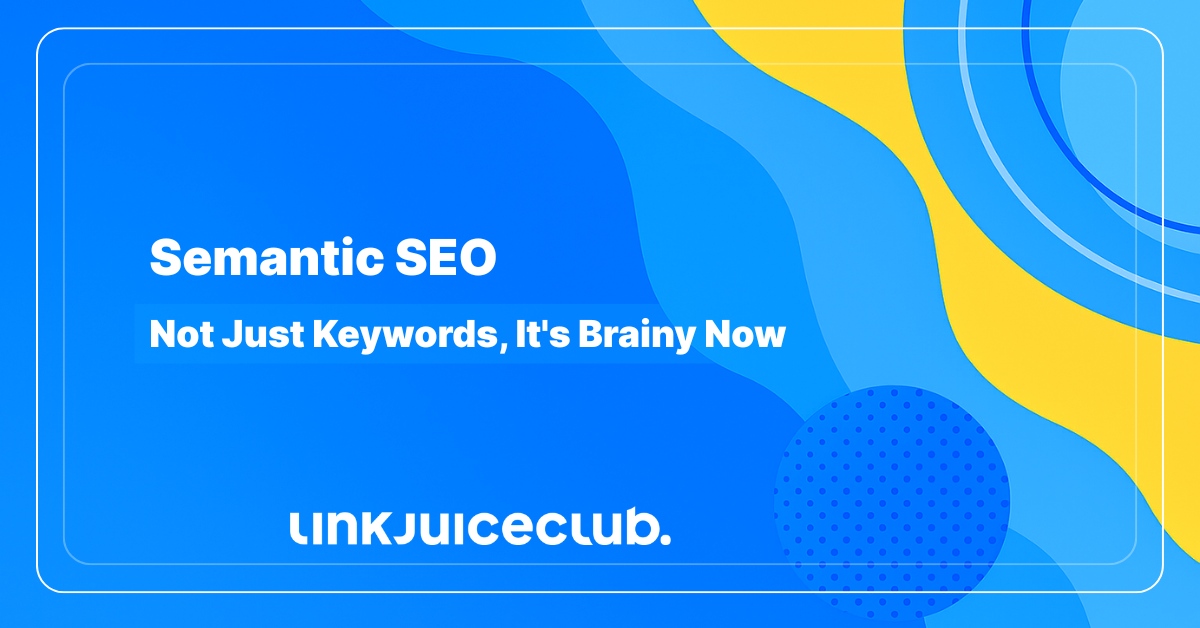
Semantic SEO: Not Just Keywords, It’s Brainy Now
So, what’s the deal with semantic SEO? You can understand it as the glow-up of traditional SEO, the nerdy cousin who went off to study linguistics and came back understanding everything you meant to say.
Gone are the days when stuffing exact-match keywords into every nook and cranny of your page got you ranking. Now, it’s all about vibes, or more precisely, intent and context.
Thanks to smartphones, laptops, and voice assistants who pretend they’re your friends (looking at you, Siri!), the way we search has changed. We don’t just type pizza delivery. We ask, Where can I get pizza fast near me that isn’t trash?
And semantic SEO is what helps Google not only get what you’re saying — but what you mean.
What Even Is Semantic Search?
Semantic search is Google trying to understand meaning, not just keywords. It looks at the intent behind a query, the context of the words used, and the relationship between topics.
In simple terms: Google doesn’t just see what you typed. It tries to figure out why you typed it.

So if someone searches best budget phones for students, Google won’t just look for that exact phrase. It’ll pull in content that understands what a student needs, what budget really means in that context, and which phones are actually relevant.
That’s the foundation of semantic SEO – creating content that matches intent, covers related topics, and goes deeper than just repeating keywords. If you’re still relying on repetition instead of relevance, you’re doing it wrong.
Why Semantic SEO Actually Matters (Like, a Lot)
If you care about rankings, traffic, or not being invisible on Google, semantic SEO isn’t optional anymore.
By focusing on relevance and intent, you’re giving both users and search engines what they actually want: real answers, useful content, and a better experience overall.
Here’s what that means for you:
- More qualified traffic (the kind that sticks around and converts).
- Smarter content that’s easier for Google to understand and rank.
- Better UX because your pages make sense to actual humans.
So, this is not about visibility – it’s about meaningful visibility.
Let’s Talk Google’s Brain: The Knowledge Graph
Behind the scenes, semantic search is powered by something called the Knowledge Graph, Google’s massive web of facts, entities, and relationships.
Think of it like Google’s cheat sheet for understanding how things are connected.
When you mention Elon Musk, SpaceX, and Tesla, Google knows they’re not three random words; it knows the story behind them. That’s how it serves up results that feel spot-on, even if you didn’t use the exact terms.
And yes, semantic SEO taps into that. When your content is well-structured, well-contextualized, and clear about the topics it covers, it fits neatly into that graph (which means better rankings for you).
What Semantic SEO Means for Your Strategy
Here’s the reality check: people don’t search like robots, so your content shouldn’t read like it was built for one.
Semantic search is all about context. That means if you’re still clinging to one exact phrase and calling it a day, you’re leaving rankings (and revenue) on the table.
Modern queries are conversational; they’re messy, varied, and full of intent. So instead of obsessing over one version of a keyword, your content needs to answer the broader question behind it.
Let’s say someone types Italian food. Cool. But… Do they want a recipe? A restaurant? A breakdown of regional pasta styles? You need to figure out the why behind the query, that’s where the SEO gold is hiding.
Building a Semantic SEO Strategy That Doesn’t Suck
If you want to stop guessing what Google wants and actually start ranking like a boss, it’s time to put a proper semantic SEO strategy into play. No keyword stuffing. No cheap tricks. Just smart, structured, human-first SEO that search engines love to crawl.
Start With Data: Monitor, Measure, Adjust
You can’t improve what you don’t measure. Use solid analytics tools to track how your content performs after rolling out semantic SEO changes.
Are users sticking around? Are rankings moving? Is traffic going up, or did you just rewrite your blog for vibes?
Look for patterns. If a page suddenly tanks after you optimized it, maybe your content isn’t as helpful or relevant as you thought. Let the numbers speak before you touch anything else.
Let NLP Tools Do the Heavy Lifting
Before you start reworking your entire content library, get some intel. Use Natural Language Processing (NLP) tools to analyze your existing content and uncover the real topics and keyword variations your site already ranks for and where you’re missing the mark.
This gives you a roadmap of what topics Google already associates you with (and which ones it doesn’t). From there, you can figure out where to go deep, where to update, and where to fill in the semantic gaps.
Write Like a Human (With a Brain)
Content is still king, but only if it’s relevant, deep, and not written like a chatbot with amnesia.
Semantic SEO doesn’t mean sounding smarter than your reader. It means creating content that answers questions, adds context, and speaks to real people and machines at the same time.
Cover topics holistically. Include FAQs. Use natural language. Mention related entities. Give Google everything it needs to connect the dots. And give your audience a reason to stick around!
Why Semantic SEO Is a Total Game-Changer
If you’re still asking What’s in it for me? when it comes to semantic SEO, buckle up. Here’s how it pays off big time:
Attract People Who Actually Want What You Offer
Clicks are cute, but what you really want is traffic that converts. Semantic SEO helps you pull in users who are actively searching for what you’re selling.
When your content aligns with search intent, you stop wasting time on drive-by visitors who bounce in confusion and start getting high-quality traffic that sticks, clicks, and converts.
Better Rankings That Actually Make Sense
SEO without relevance is just noise! Semantic SEO helps Google understand your content on a deeper level, which means higher rankings for the right queries, not just random keyword wins.
Content That Feels Smart, Not Stuffed
No more bloated blog posts packed with keywords like it’s 2008. With a semantic SEO approach, you focus on depth, context, and meaning. Your content answers questions clearly, covers related topics naturally, and actually feels useful.
More Conversions, Less Guesswork
When you combine qualified traffic with content that speaks directly to users’ needs, magic happens: people start converting.
Basically, you’re not just bringing people in; you’re showing them exactly what they came for. That’s how conversions go up without you begging for them.
Stop Chasing Keywords. Start Building Meaning
The SEO game has changed, and semantic SEO is no longer optional if you want to win it. It’s the difference between content that just ranks… and content that resonates.
So this is the bottom line:
If your content doesn’t understand people, why should Google bother understanding your content?
Write with intent. Structure with purpose. Rank like a legend.
And if you need backup, we’re right here. At Link Juice Club, our crew of seasoned pros builds content that actually speaks Google’s language ( and gets results that matter).





